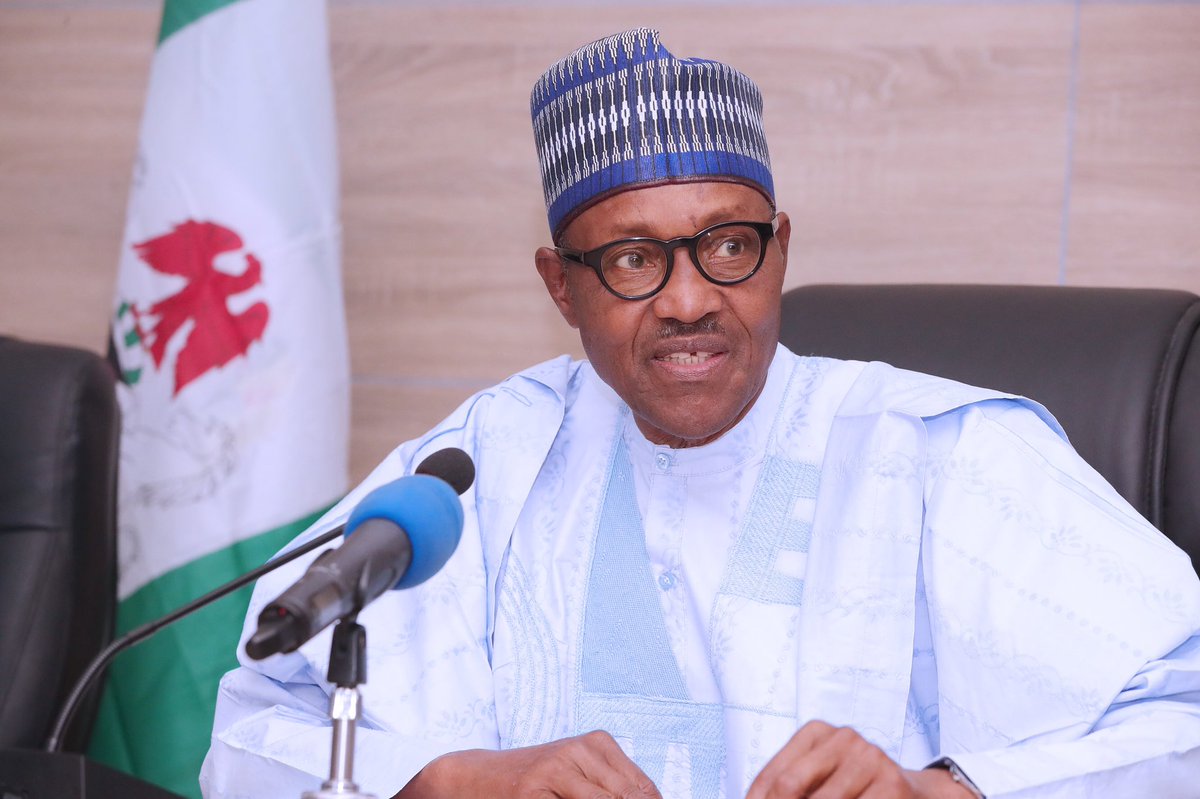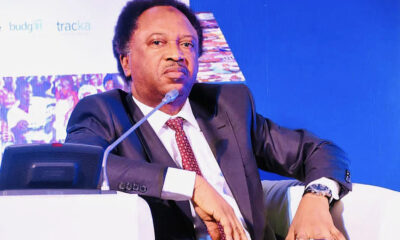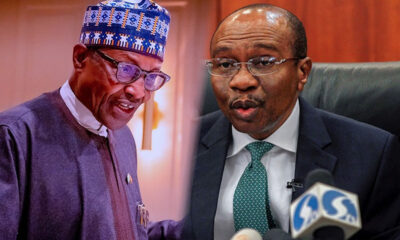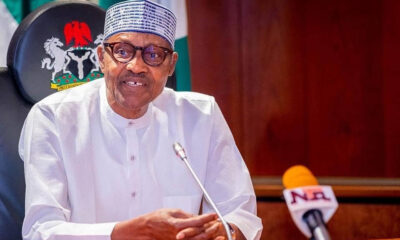Business
Buhari: We are set to reopen land borders

President Muhammadu Buhari on Tuesday said the Federal Government was set to reopen the nation’s land borders.
He gave this indication after a closed-door meeting with the 36 state governors even as he urged the governors to work more with traditional rulers and community members to improve local intelligence gathering to aid the work of security agencies.
The meeting held at the Presidential Villa, Abuja focused on the issue of security.
The President explained that the closure of the nation’s land borders was partly an attempt to control the smuggling in of weapons and drugs.
A statement issued by Senior Special Assistant to the President (Media & Publicity), Garba Shehu, quoted the President as saying, “Now that the message has sunk in with our neighbours, we are looking into reopening the borders as soon as possible.”
The President, who listened to presentations by a governor from each of the six geopolitical zones on their specific security challenges, recalled that in the old order, communities identified newcomers and passed information to constituted authorities.
Buhari said, “The sub-region is no longer safe, more so with the collapse of the former Libyan leader, Muammar Gaddafi’s regime and the cross border movement of weapons and criminals.
“Governors must work with traditional rulers. Try and work with traditional rulers to boost intelligence gathering.”
The President said his administration had done well in the North-East and South-South, adding that the South-South situation was still worrisome.
He said, “Every day I get situation reports about illegal refineries and the blowing up of pipelines. You must stop local rogues from sabotaging oil installations.”
Addressing the issue of banditry and kidnapping in each of the geo-political zones, President Buhari said, “Security is important and we must secure the whole country. We are thinking very hard on the issue of kidnapping. We will make it possible for the military to get to the bandits and kidnappers and eliminate them.”
He gave assurances that the country’s military would continue to get the support needed to fight criminals.
“I am not going to the public to speak about the vehicles and equipment we have ordered. What I can say is that the military received armoured cars and other equipment and they are training the trainers. More of such equipment, including military aircraft will come in,” he said.
Auto
Luxury bus owners: Count us out of planned mass protest

Luxury bus owners: Count us out of planned mass protest
Long distance road transport owners and operators whose buses ply various routes across Nigeria have dissociated themselves from the ‘Days of Rage’ nationwide protests planned to commence on Thursday, August 1, 2024.
The transporters under their national umbrella body, Association of Luxury Bus Owners of Nigeria (ALBON), disclosed this at a press conference in the Utako area of Abuja on Thursday.
They described the planned protests as an ill wind that would blow anybody no good.
Briefing the press on ALBON’s position after a meeting in their Abuja office, the association’s leadership led by the President, Mr. Nonso Ubajaka, said experience had shown that such protests are usually infiltrated by hoodlums using the opportunity to unleash violence.
He said members reasoned that if held, the protests could lead to loss of lives and wanton destruction of properties.
He said the resolution of the members of his association had been conveyed to the Minister of Transportation, Senator Said Ahmed Alkali, making it clear that they would not be a part of the planned protests.
The association acknowledged that there is economic hardship in the country, with Nigerians feeling the impact of rising food prices and high cost of living.
The ALBON leadership, however, urged those planning to protest to have a rethink and seek more peaceful ways of getting the government to address the problems, including making themselves available for peaceful dialogue.
The ALBON president drew attention to the fact that members’ vehicles operate from Utako to other parts of Nigeria, as well as from other cities and towns to various destinations across the country, which could make their vehicles vulnerable.
Ubajaka said ALBON members could not afford to risk making their buses the targets of violent protests.
He sued for meaningful dialogue while the government works towards finding solutions to the identified problems.
He said, “We don’t want to put our businesses at risk and expose the lives of the people we serve to danger through protests.
“The government has taken steps to mitigate the several national challenges that we are having.”
He called on ALBON members to disregard the planned action, which he continually referred to as a product of “social media” resolve.
Business
Nigeria’s debt service ratio drops from 97% to 68% – Finance minister

Nigeria’s debt service ratio drops from 97% to 68% – Finance minister
Nigeria’s Finance and Coordinating Minister of the Economy, Wale Edun, on Thursday, reported a dramatic drop in the debt service ratio from an alarming 97 per cent in June 2023 to a more sustainable 68 per cent in 2024.
Addressing a press conference on the economy’s half year performance in Abuja, Edun asserted that the reduction allows the government to redirect funds to essential sectors such as infrastructure, education, healthcare, and social services, thereby improving credibility with investors and international financial institutions.
The Minister also noted a decline in Nigeria’s total debt, both domestic and foreign dollar-denominated debt fell from $181 million to $98 million, attributed to timely payments to contractors and the government’s exit from the Ways and Means financing scheme.
He added that the Federal Government’s economic policies over the past year have started yielding positive outcomes.
Edun highlighted an extraordinary 30 per cent growth in non-oil income, surpassing last year’s performance and exceeding budget expectations for the first half of 2024. He emphasized the government’s commitment to diversifying revenue sources beyond oil through robust tax reforms aimed at doubling government revenue as a percentage of GDP, from approximately 14-15 per cent to around 25 per cent.
He outlined strong measures to improve revenue collection, including technological advancements and process optimization within revenue-generating agencies. While oil revenue remains significant, its share of gross revenue has decreased to 30 per cent, down from 41 per cent during the same period last year.
READ ALSO:
- DSS recovers 2,000 bags of government-donated rice in Kastina
- DSS: There are plans to use mass protest for govt change
- INEC uncovers plan to disrupt Edo elections using ESSN operatives
To attract investments from Nigerians abroad, the Minister revealed that plans were afoot to issue a $500 million bond within the next four weeks.
The initiative aims to encourage diaspora Nigerians to bring their funds back home for investment, contributing to economic growth.
Edun acknowledged the hardships faced by Nigerians due to reform policies but assured that the benefits of these reforms will soon be realized. He stressed that President Tinubu prioritizes reducing food prices across the country and is deeply concerned about the welfare of ordinary Nigerians. After resolving transparency issues, the Cash Transfer Programme within the Social Investment initiative has resumed, recently covering approximately 600,000 beneficiaries.
He presented evidence of the economy turning a positive corner and noted that macroeconomic stability was becoming evident, with stable exchange rates, a reducing budget deficit, and a positive trade balance.
He added that investment flows are also positive, and there has been a comprehensive reconfiguration of federal finances to boost revenue and control expenditure.
Despite global economic challenges, Nigeria’s economy grew faster in the first quarter of 2024 compared to 2023. The growth was broad-based, spanning agriculture, industries, and services. Agricultural growth, which was negative in the first quarter of 2023, showed modest growth in the first quarter of 2024. The industrial sector grew seven times faster than in Q1 2023.
Edun noted that while inflation persists, the annual growth rate of inflation is slowing. Although there was a slight uptick in June due to seasonal factors, the overall trend indicates progress towards reduced inflation.
Edun concluded by expressing satisfaction with the well-coordinated fiscal and monetary policies, which are beginning to bear fruit. He emphasized that these policies are paving the way for sustained economic growth and stability, ultimately benefiting all Nigerians.
Nigeria’s debt service ratio drops from 97% to 68% – Finance minister
Business
Meta cracks down on ‘Yahoo Boys’, deletes 63,000 accounts

Meta cracks down on ‘Yahoo Boys’, deletes 63,000 accounts
Meta Platforms Inc., the parent company of Facebook, Instagram, and WhatsApp, has removed 63,000 accounts associated with the notorious “Yahoo Boys” scam group, the company announced in its Q1 2024 Adversarial Threat Report on Wednesday.
The accounts, deleted over the past few weeks, were used for financial sextortion scams and distributing blackmail scripts. Meta reported that a smaller network of 2,500 accounts, linked to around 20 individuals, primarily targeted adult men in the United States using fake identities.
Meta said it identified and disabled these accounts through a combination of advanced technical signals and comprehensive investigations, enhancing its automated detection systems.
“Financial sextortion is a borderless crime, fueled in recent years by the increased activity of Yahoo Boys, loosely organised cybercriminals operating largely out of Nigeria that specialize in different types of scams,” the social media giant stated.
It added, “We’ve removed around 63,000 accounts in Nigeria attempting to target people with financial sextortion scams, including a coordinated network of around 2,500 accounts.”
“We’ve also removed a set of Facebook accounts, Pages, and groups run by Yahoo Boys—banned under our Dangerous Organizations and Individuals policy—that were attempting to organize, recruit and train new scammers,” the company explained.
READ ALSO:
- Tinubu welcomes ex-Senate President Anyim into APC
- Customs seize vehicles illegally taking large amount of fuel to Cameroon
- Illegal petroleum storage facility discovered in Lagos
During the investigation, Meta said it found that most scammers’ attempts were unsuccessful, though some had targeted minors. These cases were reported to the National Center for Missing and Exploited Children.
Meta revealed that it also shared information with other tech companies via the Tech Coalition’s Lantern program to help curb these scams across platforms.
Further, the parent company of Facebook said it removed around 7,200 assets in Nigeria, including 1,300 Facebook accounts, 200 pages, and 5,700 groups that were providing scam-related resources.
These assets were found offering scripts and guides for scams and sharing links to collections of photos for creating fake accounts, it expounded.
Since this disruption, Meta’s systems have been actively blocking attempts from these groups to return, continually improving their detection capabilities.
The company noted that it has also been working closely with law enforcement, supporting investigations and prosecutions by responding to legal requests and alerting authorities to imminent threats.
The social media giant stated that its efforts extend beyond account removal.
“We also fund and support NCMEC and the International Justice Mission to run Project Boost, a program that trains law enforcement agencies around the world in processing and acting on NCMEC reports.
Meta cracks down on ‘Yahoo Boys’, deletes 63,000 accounts
-

 News2 days ago
News2 days agoNLC can’t withdraw from protest it didn’t organise – Ajaero
-

 News3 days ago
News3 days agoNorthern group attacks Reps Minority Caucus for demanding Nnamdi Kanu release
-

 International15 hours ago
International15 hours agoNetanyahu, Biden hold talks over tense Gaza ceasefire
-

 News2 days ago
News2 days agoFG unveils training programme for 1,000 Nigerians in AI, blockchain
-

 News2 days ago
News2 days agoMinimum wage: Akpabio says domestic workers can’t earn less than N70,000
-

 Africa3 days ago
Africa3 days agoDozens arrested in Uganda anti-government protests
-

 metro2 days ago
metro2 days agoWanted Lagos drug baron, Temo, arrested
-

 metro2 days ago
metro2 days agoPastor remanded for allegedly defiling teenager, attempting abortion














You must be logged in to post a comment Login